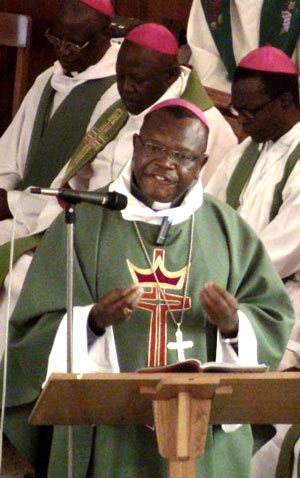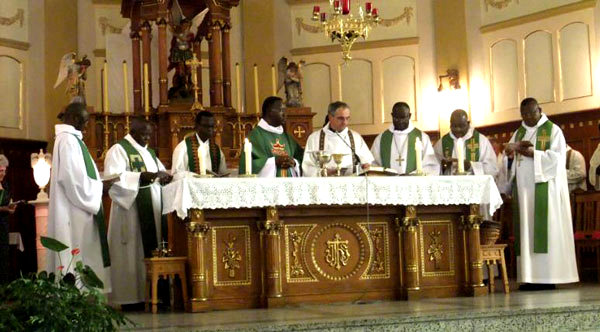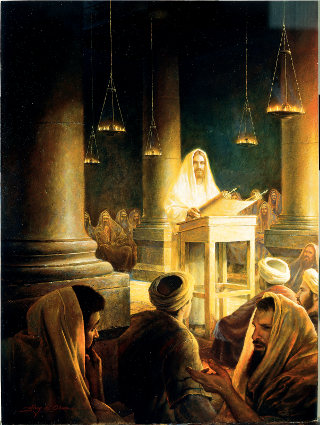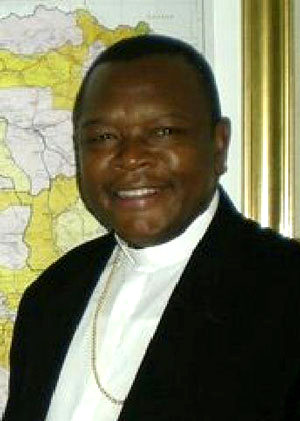Commitment for the liberation of the poor
"It is today that we must commit ourselves for the liberation of the poor"
 Homily of Most Rev. Fridolin Ambongo, O.F.M. Cap., bishop of the diocese of Bokungu-Ikela in the Democratic Republic of Congo, at St. Michael’s parish church in Rougemont, Monday, August 30, 2010, on the occasion of the week of study which preceeded our Congress. He is a priest since 1988, a bishop since 2005, and is currently the President of the Justice and Peace Commission for his country:
Homily of Most Rev. Fridolin Ambongo, O.F.M. Cap., bishop of the diocese of Bokungu-Ikela in the Democratic Republic of Congo, at St. Michael’s parish church in Rougemont, Monday, August 30, 2010, on the occasion of the week of study which preceeded our Congress. He is a priest since 1988, a bishop since 2005, and is currently the President of the Justice and Peace Commission for his country:
Dear brothers and sisters, the Gospel today (Luke 4:16-30) is very enlightening and can be adapted to the reflections that we have been studying since Friday of last week, regarding our mission.
This mission that is ours follows the mission of Jesus Christ. Jesus opens the book and randomly picks a text from Isaiah. This extract brings to the forefront the mission of Jesus Christ, the reason why Jesus came into the world. The text says: "Jesus came to bring us, who are small and weak, consolation, well-being and a better life: liberation to prisoners, food to those who are hungry, sight to those who cannot see"; in short, a new way of living, a new fraternity, a new way to live together.
It is the mission of Jesus. And the most interesting part is that He said: "This mission is accomplished today." The Kingdom of God has to be lived and actualized today. It is not a mission that we can put off until after our death but a mission that has already begun. Jesus inaugurated it and left the responsibility to His disciples to continue to carry out the mission of liberation of their brothers and sisters. We are the disciples of Jesus Christ. This call to accomplish the Kingdom of God today is addressed to us. We, the faithful Christians and particularly, we who have found ourselves at this week of study about the financial question and its consequence on the life of the world. It is to us that the Gospel is addressed. The actuality of the Kingdom of God, it is this invitation for each and everyone to take on his responsibility and make visible today the Kingdom of God that Jesus inaugurated.
|
|
|
"He opened the book and found the place where it was written, ‘The Spirit of the Lord is upon me, because he has anointed me to preach good news to the poor.’... And he began to say to them, ‘Today this scripture has been fulfilled in your hearing." |
Jesus started this mission, He did not finish it. He could not finish it. The Apostles did what they could and then they left. Now it is up to us to to actualize this mission. The reflections we have made so far during the week of study shake us up – at least we who came for the first time to talk about the "invisible hands" that govern our world and create situations with disastrous consequences.
These reflections make us think that it is today that we should take our responsibilities. If the "today" of the Kingdom was valid for Jesus Christ, it is also valid for us, it is today that we must commit ourselves in the sensitive theme of the organization of finance, to see how we can transform today’s world to make it a world that is habitable for everyone, a world of peace and fraternity.
This does not depend on others, it must start with us. This reality – the "today" of the Kingdom of God – should become a commitment for you and me; for all of us, so that from our commitment, our small contribution that we bring for the construction of this new fraternity will, little by little, be instrumental in the growth of a great work. This was the mission of Christ. He did not finish it and we have to adopt the attitude of St. Paul that he recommends this morning in the first reading (Cor. 2:1-5): and that is the attitude of humility.
We can and should be more efficient in our commitment, so that the Kingdom of God may become visible today, if we adopt an attitude of humility. It is by being humble and efficient that we will be able to spread our message, like Jesus Christ who said: "I was sent to bring the Good News to the poor, to announce liberation to captives, to open the eyes of those who sleep." The world is full of people like that – before we came here, we also had illusions, we were asleep and did not see reality – but by going towards Jesus Christ with this attitude of humility, we can help our brothers and sisters to see reality as it is. It is by facing reality that we will also, thanks to the inspiration of the Holy Spirit, have the strength necessary to commit ourselves in attacking the seemingly all-powerful enemy who is facing us.
May the Spirit of the Lord be with us during this week of study, so that all the teaching that we receive, all the reflections that we make here may help us to start to make visible in our world, the face of the real Kingdom that Jesus Christ brought to us. We must stay prudent and not fall into the desire for power, because there, we risk following in the footsteps of the powerful of this world; we must stay humble and small, perhaps it is only then that our message will be strong. Amen.
At the end of the week of study, on September 2, we asked our distinguished guests to give their reflections. Here is us what Bishop Ambongo said to us:
|
|
|
Bishop Ambongo: “We came, we saw, and we believed” |
We came (to Rougemont), we saw, and, as other bishops told you, we believed. It is a discovery. A marvelous discovery that is built on four small points: first on the luminous contents of the Social Doctrine of the Church applied to this financial system of assassins. I know a bit about the Social Doctrine of the Church because I have been a professor for nine years, speaking of the social teaching of the Church at the Catholic University of Kinshasa, until I was ordained a bishop.
I know the Social Doctrine of the Church but what was new to me was this method of applying the Social Doctrine to a concrete problem, presented in an organic way with great ease by our brilliant professor, Alain Pilote. He presented a difficult subject in a simple way, with good humor.
Some of us had studied the subject before arriving here, but I did not have any information on Social Credit. I heard of it when I arrived here. This theory was developed in ten lessons; the whole thing became so clear, I was able to make sense of it. The third element which explains this marvelous discovery, was meeting people from around the world, particularly for me, the people from the United States and Canada.
A system that crushes us
For us Africans, North America is like a huge Satan, as the Iranians say. That is to say, the evil that befalls us, the financial or economic system that crushes us, today we think that the Americans are behind this system, we think that it is a system that is promoted and supported by the Americans because it benefits them.
But we now see Americans and Canadians who are distancing themselves from this system. They are making a critical and coherent analysis to dismantle, this system of assassins, piece by piece. For me, this was a great discovery. From our point of view, this system was in the interest of the North Americans, but now we see that you, people of North America, are also the victims of this system. It is a system that makes victims on all sides. The weight of this system is felt by the north and the south, in various degrees.
Finally, what above all encourages and consoles me in this meeting is the discovery of a solution to the problem of the debt of nations. Sometimes, we feel like there is nothing we can do, because these financial leaders are all-powerful. But this session opened our eyes: another solution is possible; we did not enter into the technical details but our professor said: "They exist." As for its applicability, it is not our field, we are bishops and a bishop is not a specialist in international finance. But we may approve the principle, and we approve it with all our strength.
Now that we have been won over by this teaching of Social Credit, we will return home. What will come after? Myself I see future prospects more in terms of collaboration. I say it on two accounts: as bishop of the diocese, I can commit myself on the level of my diocese, to pass on the teaching I received here, but all the more so as being in charge of the Justice and Peace Commission for my country. I believe that the Commission for Justice and Peace in various countries are the best ally of Social Credit, of the teaching that we have received here, because this teaching is part of top proprities. It remains to be seen, what has been done so far at the level of the Commission for Justice and Peace in the Democratic Republic of Congo, and how we may elaborate a strategy of action to popularize this Social Credit system among our population.
Bishop Fridolin Ambongo,
O.F.M. Cap. of the Democratic Republic of Congo
 |
| The seven African bishops and Rougemont's parish priest (center) celebrating Mass |

